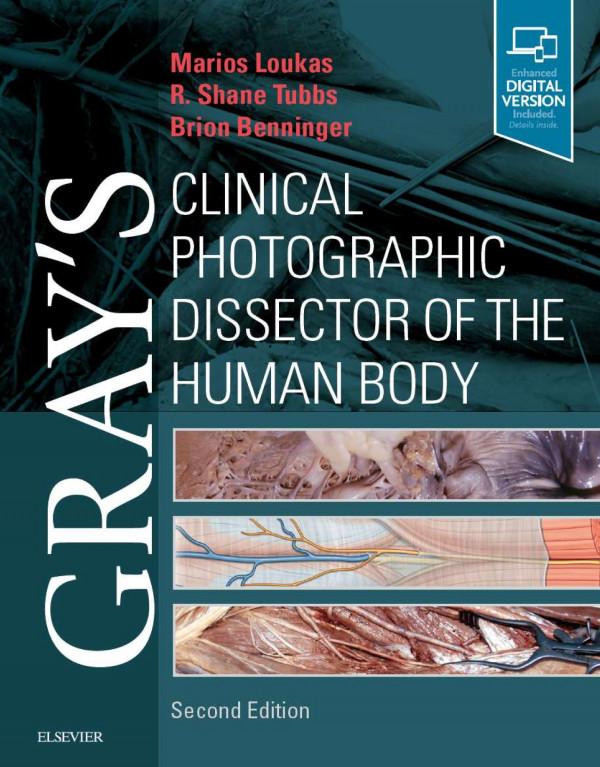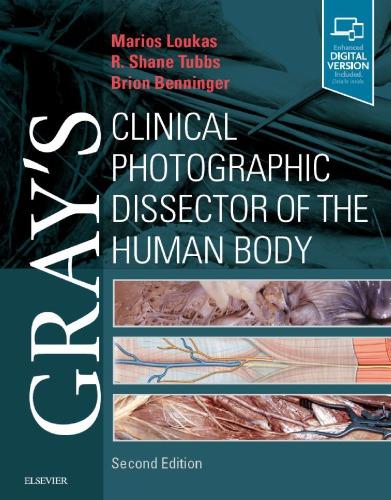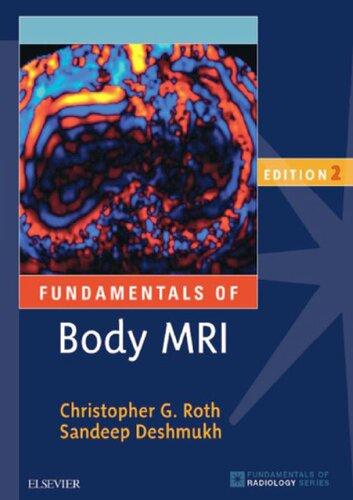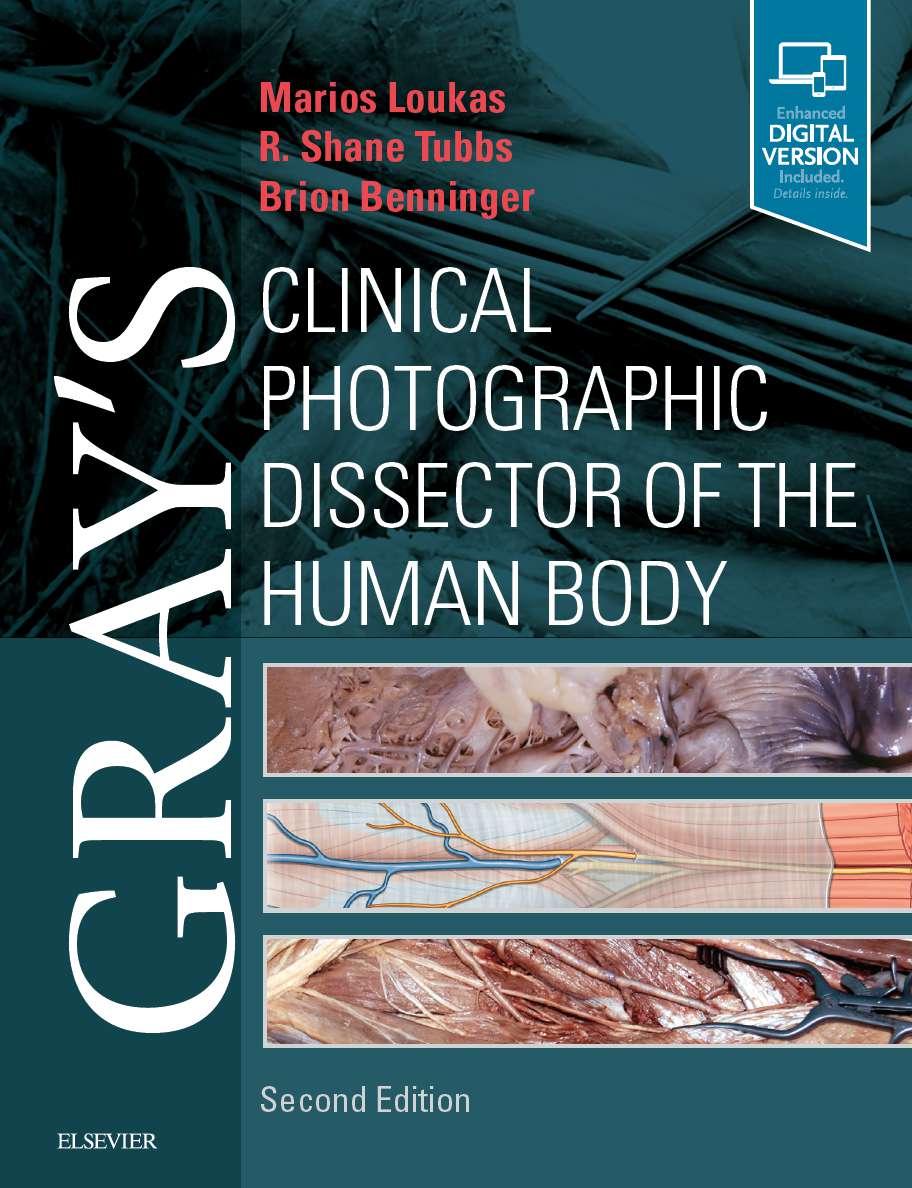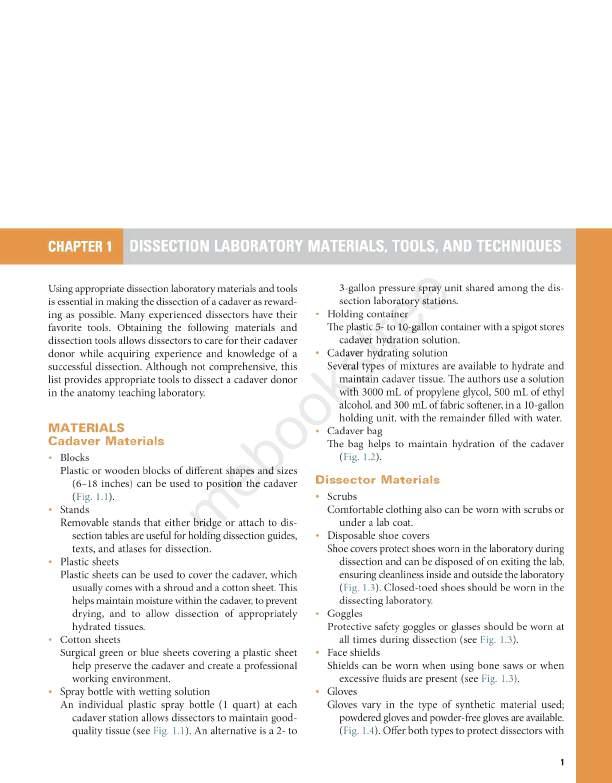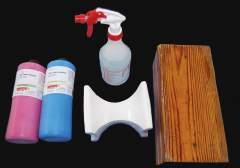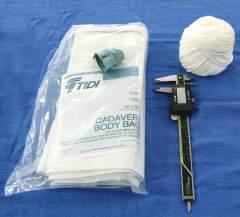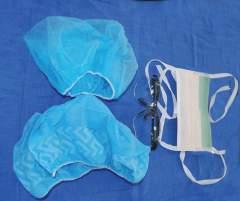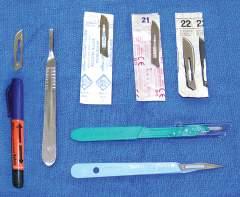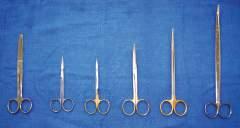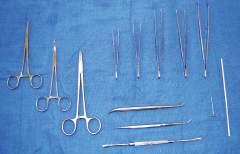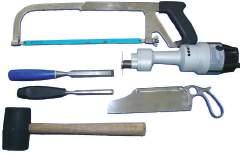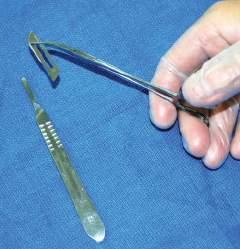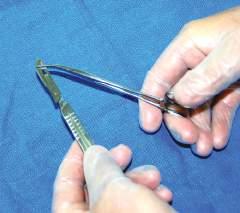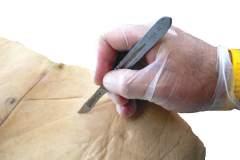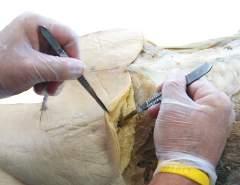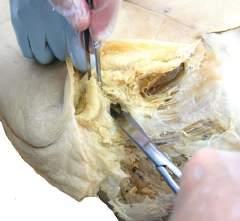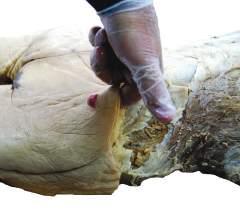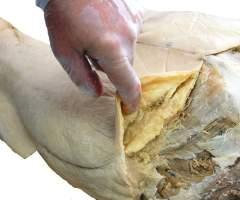PHOTOGRAPHIC DISSECTOR OF THE HUMAN BODY
Second Edition
Marios Loukas, MD, PhD
Dean of Basic Sciences
Dean of Research
Professor, Department of Anatomical Sciences
St. George’s University School of Medicine
Grenada, West Indies
R. Shane Tubbs, PhD, MSc, PA-C
Professor, Chief Scientific Officer and Vice President
Seattle Science Foundation
Seattle, Washington;
Professor, Department of Anatomical Sciences
St. George’s University School of Medicine Grenada, West Indies;
Honorary Faculty, California Neuroscience Institute
Professor and Affiliate Faculty, Institute for Systems Biology
Seattle, Washington;
Professor, Centre of Anatomy and Human Identification
University of Dundee
Scotland, United Kingdom;
Adjunct Professor, Department of Neurosurgery
Vanderbilt University
Nashville, Tennessee
Brion Benninger, MD, MSc
Professor of Medical Innovation, Technology & Research
Professor of Clinical Anatomy
Executive Director, Medical Anatomy Center
Western University of Health Sciences
Lebanon, Oregon;
Faculty, Samaritan Orthopaedic and Surgery Residencies
Faculty, Samaritan Sports Medicine Fellows
Samaritan Health Services
Corvallis, Oregon
President, Alps Innovative Medical
Healthcare and Education Futurist
1600 John F. Kennedy Blvd. Ste. 1600 Philadelphia, PA 19103-2899
GRAY’S CLINICAL PHOTOGRAPHIC DISSECTOR OF THE HUMAN BODY, SECOND EDITION
Copyright © 2019 by Elsevier Inc.
ISBN: 978-0-323-54417-7
All rights reserved. No part of this publication may be reproduced or transmitted in any form or by any means, electronic or mechanical, including photocopying, recording, or any information storage and retrieval system, without permission in writing from the publisher. Details on how to seek permission, further information about the Publisher’s permissions policies and our arrangements with organizations such as the Copyright Clearance Center and the Copyright Licensing Agency, can be found at our website: www.elsevier. com/permissions.
This book and the individual contributions contained in it are protected under copyright by the Publisher (other than as may be noted herein).
Notices
Knowledge and best practice in this field are constantly changing. As new research and experience broaden our understanding, changes in research methods, professional practices, or medical treatment may become necessary.
Practitioners and researchers must always rely on their own experience and knowledge in evaluating and using any information, methods, compounds, or experiments described herein. In using such information or methods they should be mindful of their own safety and the safety of others, including parties for whom they have a professional responsibility.
With respect to any drug or pharmaceutical products identified, readers are advised to check the most current information provided (i) on procedures featured or (ii) by the manufacturer of each product to be administered, to verify the recommended dose or formula, the method and duration of administration, and contraindications. It is the responsibility of practitioners, relying on their own experience and knowledge of their patients, to make diagnoses, to determine dosages and the best treatment for each individual patient, and to take all appropriate safety precautions.
To the fullest extent of the law, neither the Publisher nor the authors, contributors, or editors, assume any liability for any injury and/or damage to persons or property as a matter of products liability, negligence or otherwise, or from any use or operation of any methods, products, instructions, or ideas contained in the material herein.
The Publisher
Previous edition copyrighted 2013 by Saunders, an imprint of Elsevier Inc.
Library of Congress Control Number: 2018951822
Senior Content Strategist: Jeremy Bowes
Director, Content Development: Rebecca Gruliow
Publishing Services Manager: Catherine Jackson
Senior Project Manager: John Casey
Senior Designer: Amy Buxton
I would like to dedicate this book to my brilliant and wonderful wife, Joanna, who has been the bright star of my life. Her continuous support, dedication, love, and affection give me the energy and courage to fulfill all of our dreams.
ML
I would like to thank my wife, Susan, and son, Isaiah, for their support and patience during the writing of this dissector. All that I do, I do for them. I also want to dedicate this book in memory of my brother-in-law, Nelson Jones, whose intellect, engagement of others, and curiosity about life have been examples for me.
RST
It’s an honor to dedicate this work to Bill Bryan, Jim McDaniel, and Gail Hendricks, who always fought for what is right. I would also like to extend my gratitude to those who provided me with clinical pearls and critical thinking in my training during medical school and as lifelong learners—Gerald Tressidor, Peter Bell, Chris Colton, Harold Ellis, and Lynn Loriaux. Special thanks to Erik Szeto and his family for always thinking of community service and providing for all. Lastly, I am indebted to my wife, Alison, who supports my passions, my son, Jack, who remains forever inquisitive, my father, Roger, for his engineering mind and love of life, and my mother for her fight for equality and education.
BB
Credits
The following plates are from Drake RL et al: Gray’s Atlas of Anatomy, 2nd edition, Philadelphia, Elsevier, 2015.
Plates 2.1, 2.2, 3.1, 3.2, 4.1, 4.2, 5.2, 7.1, 7.2, 8.1 to 8.3, 9.1, 9.2, 10.1 to 10.3, 11.1, 12.2 to 12.4, 13.2, 13.3, 14.1, 14.2, 15.1, 15.2, 16.1 to 16.3, 17.1, 17.2, 18.2 to 18.5, 19.1, 19.2, 20.1, 20.2, 21.1, 21.2, 22.1, 22.2, 23.1, 23.2, 24.1, 24.2, 25.1, 26.2, 27.1 to 27.3, 28.1, 28.2, 29.1 to 29.4
The following plates are from Drake RL et al: Gray’s Anatomy for Students, 3rd edition, Philadelphia, Elsevier, 2015.
Plates 5.1, 6.1 to 6.4, 12.1, 13.1, 18.1, 22.3, 23.3, 24.3, 24.4, 26.1
Dissection of the human body, even in the twenty-first century, continues to be the best way of learning the intricacies of the human body. The tactility involved with dissection and the variations in structures between specimens allows the student to gain a much deeper appreciation of human morphology. However, as the time allotted for anatomical education continues to be whittled down in most curricula, courses must continually evolve. Therefore, courses that continue to dissect the human cadaver must utilize all available time wisely. Traditionally, in most anatomy courses that use cadavers, students begin their dissections with the aid of a dissector and follow step-bystep instructions of how to dissect the human body. Such guides, in general, are written much like cookbooks and usually do not provide students with a pictorial step-by-step
guide of what to expect during their exploration of the human body. When figures are used by such resources, they are almost always schematic drawings that often look nothing like the actual anatomical structures that are seen by the students. It is this deficit in the extant literature that compelled us to compile dissection photographs with accompanying text to better assist the student of anatomy. It is our hope that being able to see what students are expected to find during their dissection, from superficial to deep, will allow them to be more efficient not only in their learning experience but also with their time.
Marios Loukas
R. Shane Tubbs Brion Benninger
Acknowledgments
This dissection book is the work not only of the authors but also of numerous scientific and clinical friends and colleagues who have been so generous with their knowledge and have given significant feedback and help. This book would not have been possible were it not for the contributions of the colleagues and friends listed below.
The following instructors of the Department of Anatomical Sciences, St. George’s University, School of Medicine, Grenada, West Indies for their incredible artistic talents and significant contribution throughout the book to numerous illustrations:
Jessica Holland, MS
Brandon Holt, MS
David Nahabedian, MS
Angelica Ortiz, MS
Charles Price, MS
Xochitl Vinaja, MS
Katie Yost, MS
A very special group of medical students, members of the Student Clinical Research Society in the Department of Anatomical Sciences at St. George’s University, helped enormously with the completion of this project through their comments and criticism:
Theofanis Kollias
Elizabeth Hogan
Frank Scali
We would also like to thank the following colleagues for their technical expertise in dissections and their enormous help with this project:
Alysia Tucker, MD
Kathleen Bubb, MD
Ewarld Marshall, MD
William Merbs
Michael Snosek (PhD candidate)
Benjamin Turner (PhD candidate)
Maira DuPlessis (PhD candidate)
The following St. George’s University alumni and current research fellows of the Department of Anatomical Sciences have been great friends and colleagues. Their continuous support, comments, criticism, and enthusiasm have contributed enormously to the completion of this project:
Denzil Etienne, MD
Alana John, MD
Mitchell Muhlman, MD
Stephen Osiro, MD
Andrew Walters, MD
The following individuals from the Department of Anatomical Sciences at St. George’s University have also been very helpful with their comments and criticisms:
Olufemi Bogunjoko, MBBS
Danny Burns, MD, PhD
Cathleen Bubb, MD
James Coey, MBBS
Maira DuPlessis, MSc
Deon Forrester, MD
Rachel George, MD
Mathangi Gilkes, MBBS MSc
Robert Hage, MD, PhD
Robert Jordan, PhD
Temitope Kehinde, MBChB
Theofannis Kollias, MD
Ahmed Mahgoub, MBBS
Ewarld Marshall, MD
Kazzara Raeburn, MD
Ramesh, Rao
Vish Rao, PhD
Deepak Sharma, MD
Feimatta Sowa, MD
Kristna Thompson, MD
Alana Wade, MD
We are also grateful to the following members of St. George’s University for their photographic and technical expertise and lab assistance:
Joanna Loukas (photography and design)
Rayn Jacobs (design)
Carlson Dominique (laboratory technician)
Rodon Marast (laboratory technician)
Christopher Belgrave (laboratory technician)
Rodon Marrast (laboratory technician)
Seikou Phillip (laboratory technician)
Shiva Mathurin (laboratory technician)
Romeo Cox (laboratory technician)
Nelson Davis (laboratory technician)
Travis Joseph (laboratory technician)
Marlon Jodeph (laboratory technician)
Chad Phillip (laboratory technician)
Simone Lewis (laboratory technician)
Arnelle Gibbs (laboratory technician)
Cheryce Fraser (laboratory technician)
Also, Mrs Nadica Thomas-Dominique, Ms. Tracy Shabazz, and Ms. Yvonne James for their invaluable assistance.
The following great friends have been very instrumental over the years with their enthusiasm, continuous support, and most important, mentoring in the completion of this and many other projects:
Allen Pensick, PhD
Peter Abrahams, MD
Gene Colborn, PhD
Vid Persaud, MD, PhD
The authors would also like to thank Shivayogi Bhusnurmath, MD, and Bhati Bhusnurmath, MD, for their important comments on the pathological specimens.
The authors would also like to give a very special thank you to Drs. George Salter, Jerzy Walocha, Jerzy Gielecki, and Anna Zurada for their generous efforts in reviewing this book.
A special thanks to our friends and partners in Elsevier for this project — Jeremy Bowes, Rebecca Gruliow, John Casey, and Madelene Hyde
We would like to acknowledge all our former and current students who have kept us thinking fresh and edgy with all their comments to improve the learning and teaching of anatomy.
Finally, we would like to thank those who donated their bodies to anatomical science; without them this project would not have been possible. †Deceased.
Reviewers
In addition to the reviewers listed below, we would also like to acknowledge the valuable contributions of the reviewers of the first edition.
ARGENTINA
Susana Biasutto, PhD Professor, Anatomical Institute National University of Cordoba Cordoba, Argentina
AUSTRALIA
Fiona Stewart, MBBS, BSc Associate Professor, School of Rural Medicine
University of New England Armidale, NSW, Australia
AUSTRIA
Andreas H. Weiglein, MD Vice Chair, Institute of Anatomy Medical University of Graz Graz, Austria
CANADA
Vid Persaud, MD, PhD, DSc, FRCPath (Lond.) Professor Emeritus and Former Head
Department of Human Anatomy and Cell Science University of Manitoba Winnipeg, Manitoba, Canada
CHINA
Changman Zhou, MD, PhD Professor, Department of Anatomy and Embryology
Peking University Health Science Center
Beijing, China
CZECH REPUBLIC
J. Stingl, PhD
3rd Faculty of Medicine Institute of Anatomy Charles University Prague, Czech Republic
FRANCE
Fabrice DuParc, MD, PhD Professor of Anatomy Department of Medicine and Pharmacy
University of Rouen Rouen, France
GERMANY
Reinhard Putz, MD Professor, Institute of Anatomy Ludwig-Maximilians-University of Munich Munich, Germany
INDIA
Subhash D. Joshi, MBBS, MS Dean, SAIMS Medical College Indore, India
IRAN
Mohammadali M. Shoja, MD Medical Philosophy and History Research Center
Tabriz University of Medical Sciences
Tabriz, Iran
ITALY
Raffaele De Caro, MD
Full Professor, Director of Institute of Human Anatomy University of Padova Padova, Italy
JAPAN
Tatsuo Sato, MD, PhD President
Tokyo Ariake University of Medicine and Health Sciences
Tokyo, Japan
NEW ZEALAND
Helen Nicholson, BSc (Hons), MBChB, MD (Bristol)
Professor and Dean
Otago School of Medical Sciences
University of Otago
Otago, New Zealand
Mark Stringer, BSc (Hons), MBBS, MS (Lond), MRCP (UK)
Professor, Department of Anatomy
Otago School of Medical Sciences
University of Otago
Otago, New Zealand
POLAND
Jerzy Gielecki, MD, PhD
Dean for English Division
University of Warmia and Mazury Olsztyn, Poland
Anna Zurada, MD, PhD
Medical Faculty
Department of Anatomy
University of Warmia and Mazury Olsztyn, Poland
SAUDI ARABIA
Abdullah M. Aldahmash Chairman of Anatomy and Director of Stem Cell Unit
College of Medicine
King Saud University
Riyadh, Saudi Arabia
SOUTH AFRICA
Dr. Albert van Schoor, PhD
Senior Lecturer, Department of Anatomy
University of Pretoria
Johannesburg, South Africa
TURKEY
Nihal Apaydin, MD
Associate Professor, Department of Anatomy
Ankara University Ankara, Turkey
UNITED KINGDOM
Bernard Moxham, BDS, PhD, FHEA, FSB
Professor of Anatomy and Head of Teaching in Biosciences President of the International Federation of Associations of Anatomists (IFAA) Cardiff School of Biosciences Cardiff, United Kingdom
Jonathan Spratt, MA(Cantab), FRCS (Eng), FRCS (Glasg), FRCR Consultant Clinical Radiologist University of North Durham Durham, United Kingdom
UNITED STATES
Anthony V. D’Antoni, MS, DC, PhD
Assistant Professor of Anatomy in Radiology Department of Radiology
Weill Cornell Medicine
New York, New York, United States
Camille DiLullo, PhD
Professor, Department of Anatomy
Philadelphia College of Osteopathic Medicine
Philadelphia, Pennsylvania, United States
Anthony Olinger, PhD
Assistant Professor Department of Anatomy
Kansas City University of Medicine and Biosciences
Kansas City, Missouri, United States
David J. Porta, PhD Professor, Department of Biology
Bellarmine University
Louisville, Kentucky, United States
Kyle E. Rarey, PhD Professor, Departments of Anatomy & Cell Biology and Otolaryngology
University of Florida College of Medicine
Gainesville, Florida, United States
George Salter Jr, PhD
Professor Emeritus of Anatomy
University of Alabama at Birmingham Birmingham, Alabama, United States
Carol E.H. Scott-Conner, MD, PhD Professor, Division of Surgical Oncology and Endocrine Surgery Department of Surgery
University of Iowa Carver College of Medicine
Iowa City, Iowa, United States
Joel Vilensky, PhD Professor Emeritus of Anatomy and Cell Biology
Indiana University School of Medicine
Fort Wayne, Indiana, United States
†Deceased
Using appropriate dissection laboratory materials and tools is essential in making the dissection of a cadaver as rewarding as possible. Many experienced dissectors have their favorite tools. Obtaining the following materials and dissection tools allows dissectors to care for their cadaver donor while acquiring experience and knowledge of a successful dissection. Although not comprehensive, this list provides appropriate tools to dissect a cadaver donor in the anatomy teaching laboratory.
MATERIALS
Cadaver Materials
• Blocks
Plastic or wooden blocks of different shapes an.g sizes (6-18 inches) can be used to position the cadaver ( Fig. 1.1 ).
• Stands
Removable stands that either b idge or attach to dissection tables are useful for holding dissection guides, texts, and atlases for dissection.
• Plastic sheets
Plastic sheets can be used to cover the cadaver, which usually comes with a shroud and a cotton sheet. This helps maintain moisture within the cadaver, to prevent drying, and to allow dissection of appropriately hydrated tissues.
• Cotton sheets
Surgical green or blue sheets covering a plastic sheet help preserve the cadaver and create a professional working environment.
• Spray bottle with wetting solution
An individual plastic spray bottle ( 1 quart) at each cadaver station allows dissectors to maintain goodquality tissue (see Fig. 1.1 ). An alternative is a 2- to
3-gallon pressure spray unit shared among the dissection laboratory stations.
• Holding container
The plasti ~ to 10-gallon container with a spigot stores cadaver Hy:aration solution.
• Cadaver hydrating solution
Se eral tYJl)eS of mixtures are available to hydrate and maintain cadaver tissue. The authors use a solution with 3000 mL of propylene glycol, 500 mL of ethyl alcohol, and 300 mL of fabric softener, in a 10-gallon holding unit, with the remainder filled with water.
Cadaver bag
The bag helps to maintain hydration of the cadaver ( Fig. 1.2 ).
Dissector Materials
• Scrubs
Comfortable clothing also can be worn with scrubs or under a lab coat.
• Disposable shoe covers
Shoe covers protect shoes worn in the laboratory during dissection and can be disposed of on exiting the lab, ensuring cleanliness inside and outside the laboratory ( Fig. 1.3 ). Closed-toed shoes should be worn in the dissecting laboratory.
• Goggles
Protective safety goggles or glasses should be worn at all times during dissection (see Fig. 1.3 ).
• Face shields
Shields can be worn when using bone saws or when excessive fluids are present (see Fig. 1.3 ).
• Gloves
Gloves vary in the type of synthetic material used; powdered gloves and powder-free gloves are available. (Fig. 1.4 ). Offer both types to protect dissectors with
different skin sensitivities. Double gloving helps to prevent contact with cadaver embalming fluids, which may irritate sensitive skin.
• First-aid kit
In a dissection laboratory, nicks and pricks are inevitable, so an up-to-date first-aid kit is essential. It should contain adhesive strips (e.g., Band-Aids), cleansing solutions (e.g., hydrogen peroxide), gauze rolls/pads, and eyewash solution. The phone number of the lab director and/or physician should be posted on a wall inside the lab so that users can contact them to answer any emergency issues that may arise if students are allowed to dissect during nonformal hours.
Dissection Tools
• Cloth/measuring tape
A cloth or paper measuring tape can be invaluable when measuring distances from landmarks of surface anatomy (see Fig. 1.2).
• Skin marker
Marking pens can be helpful tools for tracing out the incision before dissection. Markers can also be used to highlight surface anatomy (Fig. 1.5).
• Disposable scalpels
Disposable scalpels have an advantage because the blade is already secured to the handle. Have a disposable sharps bin in the laboratory (see Fig. 1.5).
• Scalpel handles and blades
Metal scalpel blades are relatively standardized. Many different blade shapes and sizes are available; however, dissectors should experiment to determine which best suits them and the targets to be dissected. The authors prefer larger blades for their students. Scalpels are used primarily to make skin incisions but also can be used to reflect the dermis and areas with dense connective tissue.
Fig. 1.1 Red and blue latex wrap (to keep cadaver moist); spray bottle; plastic and wooden blocks.
Fig. 1.2 Cadaver bag and cloth measuring tape; ball of string; digital calipers.
Fig. 1.3 Disposable hair and shoe covers; mask with eye shield; goggles.
Fig. 1.4 Laboratory gloves differentiated by powder and powder free, latex and latex free.
• Sharps bin or container
For safety compliance, all dissection laboratories should have a sharps bin to dispose of scalpel blades, disposable scalpels, pins, and needles.
• Scissors
Both 5-inch and 7-inch straight and curved scissors may be used. It is important that the scissors used for each dissection are appropriate in size (Fig. 1.6). Generally, head and neck dissection can be conducted with 5-inch scissors. The remainder of the body can be dissected with 7-inch scissors. The classic scissor dissection technique is a reverse dissection. Straight and curved scissors tend to be user specific.
• Hemostat clamps
Corrugated and smooth, 5-inch and 7-inch hemostat clamps are available (Fig. 1.7). The corrugated type can be used to clamp onto the edge of skin incisions to aid in flap removal. Smooth clamps can be used to hold onto delicate structures during dissection. Hemostat clamps can be used when retracting tissue over relatively long dissection periods.
• Needle holders
The needle holder allows the user to secure and remove scalpel blades (see Fig. 1.7).
• Forceps
Toothed and nontoothed forceps are either 5 inches or greater than 5 inches long. Toothed forceps enable the dissector to grip tissue without it sliding out of the hands. Nontoothed forceps allow the dissector to control delicate tissues during meticulous dissection without damaging the tissue (see Fig. 1.7).
• Spatula probe/pointer
Instruments that have a probe or tip on one end and spatula on the other can be used to highlight dissected
Fig. 1.6 Various scissors differentiated by length and blade type (straight or curved, pointed or blunted): 6-inch Deaver, straight fine scissors, curved fine scissors, 5-inch Mayo, 7-inch Metzenbaum, 9-inch Metzenbaum.
Fig. 1.7 Left, Hemostat or artery clamps (straight and curved). Upper, Needle holder; various forceps differentiated by length, toothed and nontoothed. Lower, Probes and dissectors. Right, T-pin and orange stick.
structures. The spatula can aid blunt dissection (see Fig. 1.7).
• T-pins
T-pins (1 1 2 –2 inches) are useful in securing structures away from the desired dissection region. T-pins also can be used when setting up laboratory examinations (see Fig. 1.7).
• Chisel (osteotome)
Narrow-blade and broad-blade chisels are important for performing osteotomies and can help dissect, for example, between the occipital condyles and various vertebrae (Fig. 1.8). Chisels can be used to break up a bone surface to view the soft tissue deep to it (e.g., anterior cranial fossa).
• Rubber mallet
A mallet is used when striking the chisel to crack surface areas, such as when performing osteotomies (see Fig. 1.8).
• Electric Stryker saw
Used when cutting bone, the Stryker saw has a safety mechanism that prevents the blade from cutting the user’s skin and soft tissue.
Fig. 1.5 Various scalpel blades and handles (metal and disposable scalpels). An example of a skin marker that can be used for outlining skin incisions is shown.
• Handsaw
A simple bone saw can be used to customize various dissections and amputations for plastination (see Fig. 1.8). A handsaw is important for hemipelvectomy dissections.
DISSECTION TECHNIQUES
Using the proper technique during dissection is important when developing good dissection skills. Initially, holding the instruments correctly and practicing the techniques may not feel natural. The authors believe that cadaver dissection techniques should reflect the techniques used during surgical procedures. Learning to hold forceps and scissors is fundamental during dissection. These techniques also can be used in the operating room and certain office settings during interventional procedures.
• Scalpel
The technique for placing a blade onto a scalpel handle requires a hemostat to hold the blade and then place it onto the handle while holding the forceps (Figs. 1.9 and 1.10). When cutting with the blade, use the tip and the first centimeter of the blade. Direct the scalpel using smooth, sweeping motions (Fig. 1.11). Avoid “sawing” and “woodpecker” techniques. Dull blades that require “pushing” the scalpel are dangerous; therefore maintain a sharp blade at all times.
• Forceps
Hold the forceps as you would hold a pencil, with a pincer grip. The classic mistake is holding the forceps in the palm of the hand as if grasping. Hold the forceps vertically and perpendicularly to the target tissue to allow a 360-degree window of use (Fig. 1.12).
• Scissors
The appropriate technique when dissecting with scissors is called reverse dissection (Fig. 1.13). This requires the user to keep the scissor blades closed when entering into the tissue to be dissected, then opening
or replacing scalpel blades onto a scalpel handle. Use hemostat or needle holder to grip the scalpel blade. Line up the base angle of the blade with the tip-ofhandle angle.
the blades to create a splaying of the tissue. This results in natural separation of tissue structures and planes. Cut only tissue that is fully exposed so that the desired tissue can be preserved.
• Buttonhole maneuver
A buttonhole maneuver is helpful when dissecting a flap of dermis. Create a 2-cm parallel incision along the original skin incision, 2 to 3 cm from the edge.
Fig. 1.8 Handsaws (long and short) for bone; electric Stryker bone saw; chisel (broad and narrow blades); rubber mallet.
Fig. 1.9 Placing
Fig. 1.10 Placing the blade onto the scalpel handle tip. Generally, a clicking sound confirms the blade is secured correctly.
Fig. 1.11 Using the scalpel tip to create skin incisions. Note the grip of the scalpel provides side-to-side and back-to-front blade stability.
Fig. 1.12 Holding toothed forceps with a 360-degree view and using the scalpel tip between tissue layers while maintaining tension of superficial tissue layer.
1.13 Blunt dissection introduces the scissor tips into the tissue, and then reverse dissection opens the tissue planes.
Fig. 1.14 The buttonhole maneuver is helpful when dissecting large skin flaps and provides appropriate tension to expedite dissection. Place your fingertip(s) into the parallel incision and retract with appropriate tension.
Fig. 1.15 The buttonhole maneuver for retraction of the skin allows adequate visualization of the underlying tissue for further dissection.
Repeat this, generally near the corners of the skin flap. Place your index finger into the parallel incision, and retract the skin flap with appropriate tension that would allow either blunt dissection or a sharp edge to cut the apex of the flap (Figs. 1.14 and 1.15).
• Surface fracturing technique
The surface fracturing technique requires placing the broad blade of a chisel parallel to the bone and with as much of the blade along the bone. Strike the chisel head with a mallet using a technique that does not follow through once the head is struck. The objective is to direct the energy through the blade onto the
Fig.
Another random document with no related content on Scribd:
formally reintroduced to you.”
“It will not be worth while.” Even as she makes it Lavinia realizes the folly of her speech, opening up, as it does, the subject of their fastapproaching separation; but before her forces can come up to relieve it, the traitor within her has rushed the position, and once again the electric current runs perilously strong.
As the young Darcys have always been taught to say what they mean, and mean what they say, they credit their acquaintance with a like simplicity and veracity; and, having been invited by Captain Binning to come again soon, and bring the Siege Train, see no reason why they should not repeat their visit in compliance with a request, whose sincerity it never occurs to them to doubt, with the least possible delay. Thanks to the drag placed upon their ardour by a discreeter parent, a decent interval of three or four days is allowed to elapse before they reappear in triumph, equipped with all the munitions of war.
“You will find him in the garden,” Mrs. Prince says to her young visitors, waving her en tout cas in the direction indicated—“there among those lilacs. He is out for the first time in a wheeled chair—quite an event for him, poor lad!” Then, as they fly off in eager obedience to the direction given, she adds, sotto voce, to Mrs. Darcy, “If you could give them— Binning and Lavinia, I mean—a hint to stay within range of Féo’s windows. She likes to be able to watch them.”
But the rector’s wife must have forgotten to fulfil the delicate commission entrusted to her, since when, an hour later, Mrs. Prince joins the party, ostensibly to see on her own account how they are getting on, but in reality irefully despatched by her daughter to investigate the causes of their being completely out of sight, she finds them all grouped in a fragrant close of blossoming shrubs round the wheeled chair, whence Binning is conducting the Relief of Ladysmith. That the carrying out of that operation has reduced all the forces engaged—male and female, grown-up people and children—to the same level of excited juvenility, is proved by the fact that, at the moment of Mrs. Prince’s advent, Captain Binning and Miss Carew are contesting, with raised voices and heightened colours, the possession of the one cannon that shoots silver bonbons. For the moment they have
entirely lost sight of their own dangerously tender relations to each other, and are disputing in real anger about the possession of a ridiculous toy.
“You have come just in time to prevent manslaughter,” says Mrs. Darcy, rising from her knees with a humorously shamefaced air. “We had to shelter here from the wind,” she adds in rather guilty explanation. “I think we are going to have another cold snap.”
Either the “cold snap” alluded to, or one brought by Mrs. Prince herself, presently disperses the party, and the Darcys retreat with such precipitation as to leave the object of strife behind them on the grass.
Lavinia picks it up and eyes it unseeingly, conscious only that the voluble chaperonage of the last hour is withdrawn, and that in the green privacy of their lilac-scented bower nothing is left to protect them from each other. It will be for only a minute or two that the delicious awkwardness of their first tête-à-tête amid the glad May greenness of trees, and the erotic suggestions of wedded blackbirds will last—only till the servant who drew the chair to its present harbour can be recalled and instructed to drag it up and down along the broad terrace walk between the sundial and the fountain, in the bald publicity of all the house’s front windows, and within range of the still bedded Féodorovna’s eye.
“I withdraw my claim,” Binning says magnanimously, with a half-laugh.
“So do I!” rejoins she, relieved.
“Let it be neither mine nor thine, but divide it!”
“And to think that we should have been within an inch of a serious quarrel over such an object!” she cries, tossing the gem of the Rectory Siege Train disdainfully away. “Our first quarrel!”
At that—the phrase seeming ill pitched on and suggestive, both lapse into awkwardness, out of which, and also out of their bird-haunted brake, a footman presently expels them, lugging the one and compelling the other, since she is still on duty, into the stare of the afternoon sun on the shadeless terrace, which, or Mrs. Darcy’s “cold snap,” soon tires the invalid so much that he asks to be taken indoors.
He revives before long, however, when comfortably extended on his sofa, and removed from the heady influences of the lilac perfume and the blackbirds’ song—three amorous cocks apparently courting one hen—he and his companion have settled down into the at all events surface peacefulness of their normal relation of nurse and patient. She has proposed
reading aloud to him, and, though he has not accepted the offer with much eagerness, being no great bookman, and, like most men, disliking having his reading done for him, she persists, contrary to her usual gentle habit of following his every suggestion, and guessing every unuttered wish. After all, the manœuvre has its advantages, and he lies resigned, exploring the chart of her dear face, and making several new and delightful little discoveries.
An interruption soon occurs in the shape of a letter for Lavinia—arrived by the afternoon post, overlooked in passing through the hall, and now brought her by a servant. Her colour changes as she recognizes the handwriting. There must be something very wrong in her “State of Denmark,” as she has time to realize in a flash of compunction, for her to feel as she does, that there is an indecency in her reading a letter from Rupert under Binning’s eyes. Yet she must read it at once, too, since the fact of his writing implies something unusual, as he and his father are to return to-morrow morning, and she has never encouraged nor he permitted himself love-letters written only for love’s sake. Asking leave of her companion, formally yet with hurried uneasiness she opens and reads the missive, seen at the first glance to be unaccountably long. The man, to put her at ease and make her feel free from observation, picks up the dropped volume; but over its top, or through its boards—since such little miracles are of easy performance to that most bogus of blind beggars, god Eros—he sees that, whatever her news may be, it is of an oversetting nature.
“They are not coming home to-morrow.”
This cannot be what has upset her. There must be something more.
“Has the baptismal register not turned up yet?”
“Yes, it was found on Thursday in St. Mary Abbotts.”
He must wait her time.
“My uncle is laid up ill in London.”
“Gout?”
“Yes; but not simple gout. He felt an attack coming on, and dosed himself with the very strong remedies which the doctor has always forbidden him; got a chill on the top of that; and now he has driven it in.”
“And has sent for you to nurse him?”
“No; he will not hear of it.”
She shuts herself up into her letter, and he gets nothing more out of her for a while. She has even moved quite away from him to a distant window; still with that odd sense of immodesty in reading it while his eyes are upon her.
“I know what your impulse will be,” Rupert writes; “but you must resist it. It is not façon de parler; but he would be seriously annoyed by your coming up. It seems difficult to believe it, knowing as we have done all our lives his absolute carelessness about money; but it is, nevertheless, true that of late his one idea has been to screw and pinch in every possible way for ——”
The “for” is carefully erased; and the object of Sir George’s parsimonies left unstated; but had it been printed on a poster in letters six feet high, Lavinia could not have read more clearly that it is for those terrible unescapeable younger children of hers that Sir George is lopping his little luxuries.
“The thought that your presence would swell the bill at this ‘d——d pothouse’ as he calls it, would do more to retard his cure than even your ministrations could counteract; so stay where you are, and look after Binning, to whom please give my love. You know that among the many feminine graces for which you despise me, the gift of nursing is not the least!”
Then follows a postscript: “The poor old fellow caught his chill walking with me through yesterday’s storm, to save the expense of a cab or bus to a jeweller’s in the City, about an enamelled girdle he is having made for you; and which I have been helping him to design. Now that it is too late, he is unnaturally good and obedient—a state of things I hope to maintain by encouraging the terror under which he labours of not being well by the 28th.”
Such was certainly not Rupert Campion’s intention in writing this letter, yet the impression derived from it by his fiancée is that never were so many unpleasant facts and suggestions crowded into four sides of a sheet of notepaper. Her uncle is seriously ill, and she is not to be allowed to go to him because he is saving all his money for her and Rupert’s younger children. He has contracted his illness in the quest of an expensive ornament for her, which will add one more link to the enormous chain of obligations which is tying up her liberty with ever tighter and tighter knots. Rupert has given an
added proof of his hopelessly unmanly tastes by designing the jewel. In a dreadful flash of prophetic insight, she sees him, in the terrible matter-offact freedom of married life, sitting with his arm round her waist, and quoting Waller—
“That which her slender waist confined Shall now my joyful temples bind.”
He has sent his “love” with school-girl effusiveness to Binning; and, last and worst offence, he has alluded to the 28th!
For some moments the girl stands looking vaguely out at the rhododendron belts and azalea beds, the lawns and parterres, with a horrible feeling of hatred and physical nausea towards the man with whom she is to pass her life. Then the horror is transferred to herself, and strong reaction follows. She thrusts the letter into her pocket, goes back to her former seat, and picks up the book. Her action seems to forbid question or intrusion. But in a moment or two she lays down the volume, and makes her expiation. It does not look like one at first.
“Do not you think that complete unselfishness is the highest as well as the rarest quality that a man can possess?”
He is so much taken aback by the triteness and apparent irrelevance of the question, that she is able to enlarge uninterrupted upon her dog’s-eared theme.
“I mean do not you think that it is to be set far above generosity, or endurance, or courage, or any of that sort of showy virtues?”
“Are they showy?”
“They get a great deal more kudos, at any rate!” she retorts, with a heat he does not understand. “Do not you agree with me?”
“I do not think I ever thought about it,” he answers bluntly. “If I had, I should have taken for granted that unselfishness included all the others.”
“How?”
“Well, take pluck for instance. If a man were perfectly unselfish, he would never cast a thought to his own skin.”
“I do not at all agree with you,” rejoins she, almost rudely. “There is no relation whatever between them: the one is the loftiest of moral qualities;
the other is purely physical, a mere matter of nerves and muscles, and beef and beer.”
He lies looking at her in puzzled pain, jaded with the effort to follow the windings of her inexplicable mood.
“You will wonder what is the motive of this flat tirade,” she says with a laugh that has neither mirth nor music in it. “I must explain that I have had one more proof that Rupert is the most selfless being God ever created.”
Binning takes the wind out of her sails. “He gave me that impression;” and the only net result of the expiation is to put them both out of spirits and temper for the rest of the evening.
CHAPTER XV
T�� 28th of May has come, and the inevitable has happened. This inevitable is not that Lavinia Carew has become Lavinia Campion. On the contrary, her wedding stands postponed for a week, viz. to the 4th of June. The delay is in no degree attributable to her, but is caused by the illness of that uncle whose over-haste to be well, and determination to treat serious sickness with that high hand which it will never endure, has landed him in the same morass as it had done Féodorovna. With a reluctance proportioned to his extravagant eagerness for the object in view, with many racy expressions, and a refreshing shower of renewed insults, both wholesale and retail, distilling upon his patient son, Sir George has had to acquiesce in the deferring for an additional eight days of the attainment of his heart’s desire.
Perhaps the inevitable might have been avoided if one of several things had happened or not happened. If Sir George had yielded to his niece’s earnest entreaties to be allowed to nurse him, instead of insisting on her confining herself to a couple of runs up to London, each of so few hours’ duration as to involve no swelling of the reckoning at the “d——d pothouse;” if Rupert had not been kept or kept himself in such close attendance on his father as to have no time to see how ill his own affairs were faring; if Féodorovna had been permitted to complete her cure, and exercise momently supervision over her captive at home, instead of being despatched to Brighton—metaphorically kicking and screaming, it is true— but still despatched by a determined doctor and a for once unbullyable father; if Binning’s name had not appeared among the list of officers upon whom the Queen was pleased to bestow the Victoria Cross; if Mafeking had not been relieved! If, if! the convenient, curtsying, carneying preposition, which has salved every malefactor’s conscience since the world began! For the malefactor in question it is but a very imperfect unguent, desperate as is the perseverance with which she uses it.
If, if, if! A whole procession of them pass before her in the wakeful silence of the night; and she gives herself the full benefit of them all. But at every morning watch, what a traitor she stands at her own bar! To have taken advantage of “her men’s” absence—the very phrase, lifelong in its
employment, seems to reek of hypocrisy—to have taken advantage of their absence, of the heavy sickness of the one, and the selfless devotion of the other, to play them this coward’s trick! Yet her infidelity has only been of the soul, not of the body. Complete as has been and is the unfaithfulness to Rupert of her heart and pulses, up to the 28th of May there has been no physical contact between her and Binning beyond that one grateful touch of a sick man’s lips upon his nurse’s hand, at which not the most monopolizing of lovers could carp. When her self-contempt grows unendurable, she drags this creditable fact of outward propriety to the front, pushing it before her, and hiding behind it at Conscience’s judgment-seat.
And she has struggled! What means has she not used? what cruel, branding, searing remedies has not she tried—even to that extremest one of belittling, in her for intérieur, him whom her whole aching soul and racing blood call out upon as her only lord and love? Has not she haled to the foreground and set in malicious order his deficiencies? told herself to what a common type he belongs—just the yea and nay, straight, unintellectual Anglo-Saxon fighting man? his character, how inferior in interest and complexity to Rupert’s; his mind, how much less subtle; his apprehension, how much less quick; his understanding of herself, how infinitely inferior? And having quite demolished him, having left him scarcely comely and barely brave, she falls on his neck in the secretest recesses of her inveterately guilty heart, and begs his pardon with tears. It is not because he is a hero or a dunce that she loves him. It is for the reason which was already very old when Montaigne penned it: “Parce que c’était, moi! Parce que c’était, lui!”
By the date of the Relief of Mafeking, Binning is able to get about a little with a stick, and even to assist with his presence and advice at the bonfire which, by “kind permission of Mr. and Mrs. Prince,” has had its site transferred, for his special benefit by its builders, the young Darcys, from their own stable-yard to the ampler area of the Chestnuts. Not that the Rectory does not blaze too with subsidiary flames, and breaks out into a forest of flags that makes the bunting which had celebrated Ladysmith sink into insignificance. It would seem impossible that anything could carry the patriotic elation of the clergyman’s family to a higher pitch than it has already reached, yet it is sensibly heightened by the providential coincidence, of which the poultry-yard is the scene, viz. that it is Baden Powell who brings out thirteen chickens on the very day of the raising of
the siege. The fact is the more remarkable as two other generals, who were set upon the same day, but were wanting in the patient assiduity of B. P., produced nothing but addled eggs. It is not the Mafeking news, soul-stirring and spirit-lifting as it is, which has produced the inevitable. There is a safe publicity and generality in the emotion it evokes; and Lavinia, hurling billets of wood on to the bonfire, and being exhorted, directed, and scolded by Binning, leaning on the top of his staff, which he ultimately, in the excitement of the moment, throws in too, is in far less peril than Lavinia chokingly reading aloud to its recipient the little paragraph which announces that he is among those to whom the Victoria Cross is to be awarded. She struggles through the small naked record of his achievement.
“Captain Binning,—th Hussars, who was in command of a troop, held an important position for some time against heavy odds; and when compelled to retire, saw all his men into safety, and then, though he had himself been wounded in the left lung, supported Lieutenant Henley, who was unable to walk, until the latter was again hit and apparently killed, Captain Binning being himself again dangerously wounded a short time after.”
At the end, her hand goes out to clasp his as naturally as a mancomrade’s would have done.
“For the first time I know how it happened! You never would tell me!”
During a minute or two he can only answer her by a hand-grip, whose vigour argues a recovered hold upon life and manhood; then—
“It is a great surprise,” he says, not very steadily. “I did not even know that I had been recommended for it.”
“Do not say that you are not glad!” she cries, with a high unnatural laugh, which, in her normal state, she would have repudiated as neurotic. “Do not say that Tom, Dick, and Harry deserved it better!”
As she looks at him in triumphant challenging prohibition, at his face, still that of one stunned by the shock of a so great and honourable joy, a thin image of Rupert seems to pass vapourishly between them—not of Rupert the admirable son, the delicate reticent lover, the perfectly comprehending friend, but of Rupert in white effeminacy, paling at the mere memory of a jibbing horse. Yet the Victoria Cross is no more answerable than Mafeking and her bonfire for the happening of the inevitable. That is ironically reserved for the 28th, the day on which Lavinia was to have been married to Rupert. If it could have been staved off for twenty-four hours, it would
never have happened; since on the 29th Binning is to depart for Southampton to join the s.s. Nubia, which is taking out to the Cape drafts for half a dozen regiments already depleted by the enteric and the Boer.
The day has dawned with a splendour as ironical as all else belonging to it. Lavinia is no longer at the Chestnuts, where her services have ceased to be required, and whither Féodorovna has returned, fully recovered and wholly hysterical, to see the last of her ex-patient.
The Rectory children are all more or less bunged with tears, against which they bravely contend, and have eluded Miss Brine, and the inadequate consolation offered by her, that after all Captain Binning is no blood relation, and that six weeks ago they had never seen him, to seek the more perfect sympathy of “Lavy.” But “Lavy” is not so nice as usual; and though they find her wandering about her garden with no apparent occupation, she shows so little desire to hear or reciprocate their lamentations that they leave her in puzzled disappointment. Their mother, presently missing them, divining and disapproving their design, hastens after them; and finding them hanging, with only very partially recovered spirits, over that unexpected tit’s nest in the disused watering-can, which their jealous care has watched over since earliest eggdom, gravely dismisses them, and joins her friend.
Without speaking, the rector’s wife directs her own steps and those of a companion who seems scarcely to know, and not at all to care, where she is or what is being done with her, to the walled seclusion of the kitchen garden, as being less open to observation than the sloping lawn before the house. Yet at first the precaution seems unnecessary. There is nothing for any prying eye to see, nor ear to hear.
“Sir George and Rupert come back to-day?”
“No; to-morrow.”
“Will the workmen be out of the house?”
“Not quite.”
Silence; apparently numb on the one side; certainly self-reproachful on the other.
“What could have possessed me,” Mrs. Darcy asks herself, “to allude to the papering and painting of the nurseries?”
Lavinia remains absolutely dumb. A despair so lifeless and inarticulate frightens the elder woman; and, after a minute or two of anxious cogitation, she tries the effect of a douche of cold water on her companion’s apparently swooned soul.
“I did not think you would have collapsed like this!”
It is partially successful. “I have not collapsed. Since you know, having dragged it out of me, there is no need to pretend before you; but when it matters, I shall not collapse.”
“He is coming to bid you good-bye to-day?”
“Yes.”
“Is—is that wise?”
“I don’t know, and I don’t care.”
There is such a dull doggedness in the tone, such a clutch upon the interview referred to implied in it, that Mrs. Darcy gives a gasp.
“It won’t be good-bye!” she says presently, in a low tone of conviction —“it cannot be!”
Lavinia does not answer; not in the least, as her friend is distressfully aware, because she is acquiescent; but simply because the statement is not worth contradicting.
“I can’t stand by and see a crime committed!” Susan says, talking low and very quickly, and trying not to let her agitation get the better of her. “If you feel that it is a task beyond your strength, I will speak to Rupert for you; at the least hint, the least suggestion—heroically unselfish as he is.”
“You used not to admire him so much!” puts in the other with a bitter dryness.
“It is quite true, and it is perfectly fair that you should remind me of it,” rejoins Mrs. Darcy, humbly and ruefully; far too intent on her object to resent or even notice any blow that her self-esteem may suffer on the way to it. “I was paltry enough to allow myself to be blinded by his silly little foibles to his great qualities; but of late, during Sir George’s illness, realizing, as I have done—as every one must have done—all that he has had to give up, and with what perfect self-effacement he has done it——”
Lavinia breaks in upon her with a terrible jocosity.
“You have forgiven him his old lace and his Elzevirs! Well, better late than never!”
Her friend stares at her with aghast, wide-open grey eyes, as of one who sees a hideous blighting transformation taking place in a dear and familiar object.
“You are right!” she says, under her breath. “I thought him completely unworthy of you, so unworthy that your loss would cause him very little pain so long as he could keep, as you say, his ‘old lace and his Elzevirs;’ while in another direction I saw, or thought I saw, a possibility——” Her voice dies falteringly away.
Lavinia looks at her stoically. “You need not distress yourself; you have neither made nor marred in the matter.”
Another grim silence.
“Will you empower me to tell Rupert?”
“Tell him what?”
“Will you tell him yourself?”
“Tell him what? There is nothing to tell.”
The rector’s wife pauses, brought up against this wall of senseless brazen denial; her thin sensitive face even whiter than its white wont; but she is not easily baffled, nor apt to abandon a task because it wrings her withers.
“My dear,” she says, taking gently hold of the girl’s coldly pendant hand, and using an endearment uncommon to her, being one sparing of banal caresses, “do you think that you are doing Rupert a kindness in providing him with a wife who avoids his look, winces at his voice, and shudders at his touch?”
“What the eye does not see, the heart does not feel. He will never know!” There is a wretched callousness in her voice, whose counterfeitness a slight shiver betrays.
“Not know! Rupert not know!”
The words, and the inflection that accompanies them, bring home to Lavinia the fact, on which she has often laughingly expatiated to her friend, of the extraordinary intuitive knowledge of her possessed by Rupert; of her absolute inability to keep one half-thought or fancy from his ken. That he should so turn over and handle the innocent trivialities of her mind and heart, has formerly been a matter of jest. Now the thought that there will be no secret place in her soul into which she can retire from him with her terrible secret, no gourd under whose shade she can sit hugging her misery
undetected, breaks down the fortification of her numbness, and leaves the breach open for active conscious agony to march up and take possession. She draws her cold fingers from Mrs. Darcy’s pitying clasp, and turns upon her.
“I do not know what object you propose to yourself by putting me to this torture!” she says. “I think a person should be fully in possession of the facts of a case before she ventures to give an opinion upon it.”
“That is quite true,” replies the other, gently, too full of deep compassion for the writhing soul before her to resent either the tone or the words used; “but does it apply to me?”
“Yes,” replies Lavinia, her insensibility seeming to give way to a far more distressing and unnatural access of wild discourtesy; “yes, a hundred times yes! You have undertaken the management of my affairs without in the least understanding them. If I were to take your advice, if I were to jilt Rupert as you so shamefully suggest to me, how much the better should I be? how much the nearer——?” She stops dead short, unable to name that never-to-be-reached goal.
“What do you mean?”
“What do I mean?” speaking very slowly. “I should have thought that it did not need a conjurer to discover that! I mean that I am not the only person you would have to convince!”
“What?”
“Has it never occurred to you that there may be an obstacle on his side too?” (It is plain that the possessive pronoun here does not refer to Rupert.)
“No,” breathlessly.
“Don’t you think——?”
In the determination to master a tongue restive to such utterance, Lavinia pronounces her words with a clear incisiveness that, even at this crucial moment, makes Mrs. Darcy gauge apprehensively the distance that parts the tragedy in which she is taking part from the tranquil prose of the gardener potting cuttings under a shed.
“Don’t you think it might strike Captain Binning that he has done them almost enough harm already?”
“Don’t speak quite so loud!” in quick-breathing entreaty. “You mean about Bill?”
“Mightn’t it occur to him that, having robbed them of Bill, it would not be behaving very handsomely to rob them of me too?”
The rector’s wife shakes her head mournfully. “Isn’t it a little late to think of that? He has done that already!”
“What has he done?” asks Lavinia, standing at bay, with a fierce white face of dogged championship. “What do you lay to his charge? Once he kissed my hand,—it was this one,” smiting it with the fore finger of the other; “but it was only to thank me for nursing him. That was his one crime! That was all he has ever done—all he ever will do!” In her breaking voice, in her passion-pinched face, there is but little attempt to disguise the poignancy of the smart that the belief in that reticence brings with it.
“Not even if he comes to bid you good-bye?”
Lavinia’s eyes, awhile ago so dead, light up ominously.
“You think that I ought not to let him come?” she asks between two panting breaths.
“I do.”
“That it would be wiser in me not to see him again?”
“Yes.”
Lavinia throws out her hands with a gesture of reckless defiance.
“Then I will be unwise!”
CHAPTER XVI
“Jesu, defend me; for then I rewarded your father and your brother right evil for their great goodness.”
I� is not long before Miss Carew has the opportunity either to put into execution or repent of the intention announced by her; for scarcely has Mrs. Darcy turned her back upon the scene of her failure, in crestfallen but quite unresentful sadness, before the successor whose coming she had deprecated is announced. Lavinia has let her friend go without any expression of apology or regret, and has watched her depressed slight back disappearing through the churchyard without one feeling but a vague sense of relief that she is out of the way.
It takes all the self-control with which the rector’s wife is so plentifully endowed, to enable her to receive, with the proper amount of concern, the news, which reaches her when scarcely within the Rectory gate, that Baden Powell has done to death two of his Mafeking chickens, by the simple process of putting his large yellow foot upon them, and keeping it there in serene unconsciousness of their departing squeaks. Her rôle is rendered easier by the fact that the children’s own grief at the catastrophe is much less than it would have been on any other day in the year, being merged in the far acuter one of their hero-playmate’s departure. There is nothing very heroic in the utterance with which their idol is answering the mute look which is the only greeting Lavinia can control herself into offering him.
“Am I a greater scarecrow than you expected in this coat? I was told by a man I met in Pall Mall on Tuesday that I looked like a clothes-peg! Well, one might easily look like a worse thing; and, thank God, I never had much superfluous flesh!”
It is clear that he scarcely knows what he is saying; and that, though his speech is perfectly rational in its triviality, it is so more by instinct and habit than by any conscious command over tongue or thought.
“The doctors passed you?” she asks, squeezing out the words with a parsimony that proves how little trust she, for her part, can place in her organ of utterance.
“Yes; they said that the voyage would finish setting me up. So it will.”
The last clause is, as the girl feels, a reassurance addressed to the grudging doubt and negation in her eyes—the eyes that verify how loosely the clothes hang on a frame that betrays the fact more plainly than a less largely built one would have done. How easily, how reasonably, how nothing more than humanly, they—that callous Medical Board—might have sent him back—so little more than half-cured as he is—for another fortnight, another week! Another week! yes; that he might be here to dance at her wedding!
“So this is your home! This is where you have spent your life!” Binning says, looking round at the room seen for the first and last time, and in which, in fancy, he will have to set her beside the armchair that he divines to be Sir George’s.
He pauses, not for the moment quite equal to bear placing, even in imagination, the jeune ménage. Yet he will not spare himself the pain of knowing what corner of the fragrant homely room, that bears the imprint of her and her tastes and occupations, will shelter the warm domestic nearness to each other of husband and wife.
“Tell me where you all sit, that, when I am gone, I may picture you.”
“That is Uncle George’s chair,” she says, pointing to the one that the young man had rightly assigned to the house’s master; and then stops.
“And Rupert’s?”
“Rupert has no particular chair.” After a moment, “Rupert always chooses whatever seat he thinks no one else wants; that is Rupert’s theory of life—and his practice.”
The tribute seems wrung out of her; yet she makes it, and handsomely too.
He gives a little nod of acquiescence, inwardly shocked at his own want of generosity in being able to do no more, yet—inwardly also—writhing at her praise.
“And you have lived here always?”
“Yes, always; that is, ever since Uncle George picked me out of the gutter.” She gives a forced laugh, and goes on, “You know that when I was a destitute baby he saved me from the workhouse?”
“Yes, you told me.”
“Your tone says that I have repeated it ad nauseam. Well, I have to do it, lest—though you would hardly think such a thing possible—I may forget it. I am very near doing it sometimes.”
“I do not believe it.”
There is a grit and manliness in his voice that almost contradicts the passion in his eyes—eyes in which, for all their passion, there is room too for a wondering consternation at the metamorphosis wrought in his sweet, calm nurse and comrade.
“Shall we go out of doors?” he asks, after a moment or two of burdensome silence. “We have had so few hours out of doors together.”
She reads his thought. They will be safer—safer from themselves and from each other—out of doors. It had been her own, and she is almost sure that she had meant to act in accordance with it; yet that it should come from him causes her a dull surprise, painful through all its dulness.
“Where would you like to go?” she asks, when they stand together on the garden sward facing the familiar view, the distance clearly azure-blue to-day, but over which, as she has so often triumphantly explained to visitors, a grey mist is apt to lie while her upland is in radiant sunshine. Today the cases are reversed. Sunshine bathes the distance; it is on her heart that the fog lies thick. “Where would you like to go?” she repeats. “To the Rectory, to bid good-bye to the children?”
It is out-Heroding Herod to suggest that their last hour shall be spent in company, and her heart stands still until his answer comes. If it is an assent, all danger will be over, and of that she ought to be glad. But it is not.
“Show me some pleasant walk where you often go.”
The motive which dictates the request is the same that had made him ask which chair she is wont to occupy in the drawing-room. He is collecting frames for the gallery of pictures of her that is to hang in his heart.
She gives a slight assenting nod, and sets off with an undecided step, turning over in her mind, with a view to choosing it, which of her familiar paths is the one that is least associated with Rupert’s companionship. It is safe, at all events, to begin with the churchyard. Every new-comer is shown the gigantic brother yews, and told how much is the eight-century girth of the largest one.
“It measures thirty-four feet in circumference,” she says, in a dull showwoman’s voice, as she has said scores of times before to politely astonished visitors.
And then they stand silent, staring at the erebus of shade above their heads, at the enormous branch which, in some former storm—now itself long ago—has shown symptoms of breaking away from the colossal trunk, and has taken such a gigantic prop to support it. From under the eternal night of the tree, day is seen to laugh over the rather neglected green mounds around—neglected as rural churchyards are discreditably often apt to be, but over which the kindly wild flowers are waving unbidden.
“If you outlive me, which is unlikely, this is where you may finally think of me,” says Lavinia, speaking at last. “It is not very imaginative of one to live and die on the same quarter of an acre, is it? The entrance to our vault is on the other side of the church.” She gives her piece of information with a sort of alacrity, in contrast to the muffled dulness of her last sentences.
“You say it as if you were telling me a piece of good news.”
“You wished to know where I generally sit and walk. I thought you might carry your interest a step further, and like to know where I am to lie.”
He turns aside, as if to examine one of the chipped truisms on a lichened headstone; but not before she has seen a glimpse, and divined the rest, of the disfigurement her cruel and unworthy appeal to his pity has worked on his still sickness-thinned and hollowed face. A bitter pang of selfcondemnation adds itself to a mocking memory of one, and the most emphatic, of Féodorovna’s nursing injunctions—to be sure not to mention any subject in the least painful to her patient. Is this the way in which she is fulfilling it? He is trying his hardest to behave like an honourable gentleman; and instead of helping him, she is—because it gives herself some relief from her intolerable pain—setting the stumbling-block of her cowardly bid for compassion in his way. She half puts out her hand to touch the sleeve which still bags upon his arm; then draws it back.
“I have thought of a walk,” she says, in a better and braver voice.
Up a steep cart-track, skirting a hop-garden, where the soaring poles and lofty roof of intertwisted network tell of the faith that the now infant plants, scarcely beginning to clasp their supports, will presently engreen the whole land; then down one of its naked aisles; across two cheerful meadows, where strong lambs are capering among the buttercups; to a gate that gives
entrance to a brake, in whose midst an inconspicuous pool half hides itself and its water-hens. Lavinia pauses, with her hand on the top bar, and an expression of doubt in her face. The place looks more solitary than its wont. Will he think that she has betrayed him into an ambush even more dangerous than that of the house—he, between whom and herself, all along climbing upland, and through sunny pasture, the dead Bill and his living kinsmen have seemed almost visibly to walk?
“It is scarcely a wood,” she says hesitatingly. “There is not a tree of more than twenty years’ growth, and the nightingales sing so loudly here that they will save us the trouble of talking.”
His answer is to give the gate an unsuccessful push.
“It is locked.”
“That is very unusual,” she answers, for an instant harbouring and at once angrily dismissing from her mind a superstitious idea that the homely obstacle may be Balaam’s winged prohibitory angel in a different dress. “It is almost always open; but nothing is easier than to climb it.”
He swings himself obediently over, and stands on the other side to give her his aid. But she motions him away, crying almost repellantly—
“Go on! go on! I do not need any help.”
If he receives her into his arms, even in the mechanical and prosaic civility of assisting her to bestride a five-barred gate, she knows that were ten thousand dead Bills and living Ruperts to interpose their pale prohibitions, the inevitable must happen.
Lavinia has spoken accurately. The pleasant spot in which their agility has landed her and her companion is not a wood. It is merely one of those low green tangles of hazel and maybush, sapling chestnut, and gnarly willow, whose woof is nowhere too thick to let in a thrifty shower of temperate sunbeams; and through the woof of whose carpet the blue hyacinth dye runs dim and rich. A path not wide enough to admit of any couple save a lover-pair walking abreast, girdles the little sheet of water at quiet play with its dancing flies and leaping fish and placidly oaring moorhens. From the heart of one of those brakes, whose semi-privacy seems to provoke the nightingale to uttermost extremity of song, one is now turning his whole little brown body, dimly seen sitting on a hawthorn bough, into a shout of heavenly self-congratulation upon finding himself in
such a beautiful May world, and with a demand for love too exquisitely worded to be denied.
Arrived at the pool-side, within a few yards of him, the human couple, of whom he is so much too joyful to be the little spokesman, stand quite still, in fear of scaring him; but in his happy little heart there is no room for fear, and from the look of the poor souls he knows that they are not enemies.
“I told you that he would save us the trouble of talking,” says Lavinia under her breath.
He has saved the lesser singers of his own genus the same trouble, apparently; for whether quelled or entranced, or learning those imitations which they will afterwards practise with clever inferiority, they are dumbed.
Lavinia listens at first with a sense of relief. The divine organ that lies in that little parcel of feathers is uttering all the longings, all the merging of two into one, all the fruition-nearing desires to which she may never, never give voice. To the deceit of that seeming relief succeeds an intolerable revolt. Why should she of all creation alone be silent? Why should not she for once speak out? Why, since this little island of time upon which they stand is their very own, since they have no future, since they have been ironically given this one half-hour to show them what life might have been, —why should not they be wise, and, pushing aside those dim ghosts which they themselves have quixotically interposed between the aching reality of their own bruised hearts, slake their terrible thirst for each other in one first and last draught?
The temptation to throw herself upon his breast is so strong, that to her dazed senses she almost seems to herself to have already yielded to it, though in effect she has only stood in pale maidenliness at his side; but the illusion is so vivid, and the reactionary shock of horror at herself so potent, that she walks with unsteady haste away from her companion towards the singer, whom her movement puts to flight.
“You have frightened him away!” says the young man, standing still on the path.
“Yes; I am glad.”
“Glad! That is not a word that one seems to have much use for just now!”
His tone tells her that the temptation is strong upon him too, and his action, in adding two or three more yards to those she has already set
between them, that in deadly struggle he is grappling with it. If she were his true love, would not she come to his aid? With a prodigious effort she clears the red mist from before her eyes, and steadies the trembling in her traitorous hands. Then, rejoining him, and beginning to resume the walk that their charmed ears had first interrupted, she says, in a tone to whose cheerfulness she tries with all the force of her will-power not to give a hysterical ring—
“After all, there is a good deal to be glad of, if one comes to think of it— your recovery, your Victoria Cross——”
“Yes,” indistinctly; but with an effort, whose suffering manliness she recognizes, to follow her lead—“yes; I am a sweep to complain!”
It nerves her to new effort. “Was not Féodorovna very much excited at your getting it?” her terror of herself driving her on into a torrent of trivial questions. “How is Féodorovna? is she yellow still?”
“No; not at all.”
“Is she quite herself again?—quite recovered?”
“She is supposed to be.”
“But you think that she is not?”
“I think she is—rather—hysterical.”
Lavinia’s feverish trickle of inquiry drops into silence. Between the lines of his brief words, and in the constraint of his tone, she reads that the method adopted by Miss Prince to show her hysteria has been to throw herself into his arms, as she had done by letter into General ——’s, and has volunteered to follow him round the globe, as she had generously done in the case of his predecessor. Well, she herself has been within an ace of a similar action during the last five minutes. She ought, therefore, to feel a sympathy for the same abandonment on the part of another. And yet, although Miss Carew knows, as well as if she had been present at the drama, that Féodorovna has remained in Binning’s arms not a moment longer than the space of time needed for him to find a chair in which to deposit her, yet a dizzying jealousy seizes her at the thought that, though only for a minute, and deeply against the will of the object of her amorous demonstration, Miss Prince has lain on that breast whose pulsing against her own Lavinia will never feel.
“Hysterical!” she repeats, after a pause, in a low key of suspicion. “Why was she hysterical? How did she show that she was hysterical?”
A slight flush, or so she fancies, passes over his hollow cheeks.
“Oh, I don’t know. How do people usually show it?”—with impatient evasion.
“Laughing? Crying?”
“Yes, yes; that sort of thing!” Then, with an upbraiding accent, that escapes him against his will, “Why should we talk about her, poor soul?”
“Why not?” she answers. “What else is there to talk about? There is nothing else.”
The words, extravagant as they are, represent to Lavinia the exact truth. He! She! There is nothing else in God’s universe; and before both him and her stands the prohibitory angel, the flame of whose waved sword blinds them to all creation also. She looks straight before her in dogged despair, and a caught half-sobbing breath beside her tells her with what a strangling grip the temptation is taking him by the throat. Yet this time she puts out no finger, utters no wisely trivial commonplace to help him. The mental picture of Féodorovna clinging sobbing round his neck, even though she knows with what repellant grudgingness that embrace had been met, has robbed Lavinia of all further power of fight than what lies in silence. He does not leave her even that.
“We shall hear of each other indirectly, I suppose?” he says by-and-by, in a voice not the clearer for the lump in his throat, which is clearly past his power to swallow.
Her cup of misery runs over. “No doubt,” she answers with a shuddering distinctness. “If you ask Féodorovna, she will write you a long account of my wedding! She is a great letter-writer!”
As if the words possessed some paralyzing spell over their feet, both of them stop dead short; and, turning round, stare full in each other’s faces, conversation shrivelling up its thin fabric in that fiery moment; and then— the inevitable happens. The gasping lips draw nearer, nearer, nearer; the idly hanging arms stretch themselves out, enfold, embrace, crush; and, with no apparent initiation on either side, Fate hurls them upon one another’s forbidden breasts. Their kisses are frantic with the haste of six wasted weeks, and have their edge given by the knowledge that, for these sad two, there is only one little dreg at the bottom of the wine-cup of life and love,
and that if they do not make haste to drain it, it will be poured out on the desert ground that is soaked with the lost vintages meant to appease the thirst of parched humanity.
They have thrust away the irksome apparition that had officiously flitted between them. For such a ghost’s thin body there is no room between his heart and hers. Out of both those hearts all their former long-established, deep-rooted inhabitants are turned, driven by the flail of the one supreme scourge. In those hearts Honour had held her high court, Duty had wielded her sceptre, unselfish Family Affection been warmly nested. Now, of none of them is there a trace left in either consciousness. For neither of them does anything exist but the omnipotent primal instinct—the instinct that drove the first man and woman into each other’s throbbing arms.
It is not for long—not for more than a few moments—only for one kisslength, that that mad, dumb, clinging oblivion endures. Then the old ejected law-givers begin to gather up their sceptres and return; boldly ejecting, in their turn, the furious rebel that had ousted them; and the two that God has not joined together stagger apart. As in the impulse of embrace neither was earlier or later than the other, so is the shock of disunion common and simultaneous. They find themselves standing apart, uncertainly staring at each other in the imperfect consciousness of an enormous joint crime. It was only a kiss—an utter, scorching, lover’s kiss, it is true—yet still only a kiss that has so seared their re-awakening consciences; but had their disloyalty gone to the extremest pitch of unfaithfulness, it could hardly have branded them with a deeper sense of guilt. Her white lips frame three scarcely audible words, which he yet hears—“This—day—week!”—and he whispers, in horrified ejaculation, “Rupert! Bill!”
There is a terrible silence—at least, it seems so to them—though the nightingale, scarcely scared, and having taken but a short flight to the branch of a youngling chestnut, is finishing his epithalamium with even bettered music. The reinstated judges have taken their seats, and are holding a dread assize.
“It is only I who am to blame!” says Lavinia, by-and-by, in a key a little above her former one. “You did really struggle. If I had helped you honestly, you would have pulled through; but I did not. I never really meant you to hold out! I see now that I meant it all along to happen! I meant you to kiss
me! I thought—God forgive me!—that I should be able to bear my life better afterwards if you did!”
“If I had been honest,” he says hoarsely, “shouldn’t I have accepted your offer of taking me to the Rectory? You know you did offer. If I had meant honestly, should I have come here?” casting a glance of despairing reproach round at the blue and green and silver accessories to his fall—smiling water and curtsying sedge and sky-coloured blue-bells.
“But I brought you here!” cries the other culprit, in a heart-rending eagerness, of which he will not suffer her to have the monopoly—to assume all the weight of their “most mutual” lapse.
“It was a pity that Bill did not leave the Boers to finish me!”
Then there is silence again. This time it is the man who breaks it, though his tone is so low as to constitute scarcely an infringement of the crushing guilty stillness.
“And you will still marry him this day week?”
At that she veils her face with both hands. “What am I?” she says indistinctly, through the relief of their shield. “What have I become? I have lived for twenty-three years, and I never suspected that there was a bad woman inside me!”
“And for twenty-eight years I have imagined that I was a gentleman!”
